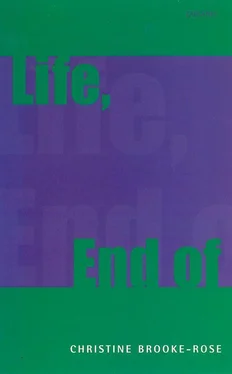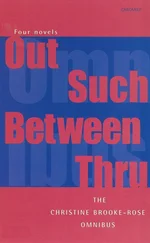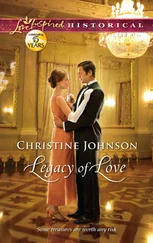Christine Brooke-Rose - Life, End of
Здесь есть возможность читать онлайн «Christine Brooke-Rose - Life, End of» весь текст электронной книги совершенно бесплатно (целиком полную версию без сокращений). В некоторых случаях можно слушать аудио, скачать через торрент в формате fb2 и присутствует краткое содержание. Год выпуска: 2012, ISBN: 2012, Издательство: Carcanet Press Ltd., Жанр: Современная проза, на английском языке. Описание произведения, (предисловие) а так же отзывы посетителей доступны на портале библиотеки ЛибКат.
- Название:Life, End of
- Автор:
- Издательство:Carcanet Press Ltd.
- Жанр:
- Год:2012
- ISBN:9781847775726
- Рейтинг книги:5 / 5. Голосов: 1
-
Избранное:Добавить в избранное
- Отзывы:
-
Ваша оценка:
- 100
- 1
- 2
- 3
- 4
- 5
Life, End of: краткое содержание, описание и аннотация
Предлагаем к чтению аннотацию, описание, краткое содержание или предисловие (зависит от того, что написал сам автор книги «Life, End of»). Если вы не нашли необходимую информацию о книге — напишите в комментариях, мы постараемся отыскать её.
by a master of experimental novels finds the author reflecting on her old age and its effects on her writing. As she reflects on her own career, her experiments with narrative, and on the narrative she writes here, she ultimately reasserts herself and accepts the life behind her.
Life, End of — читать онлайн бесплатно полную книгу (весь текст) целиком
Ниже представлен текст книги, разбитый по страницам. Система сохранения места последней прочитанной страницы, позволяет с удобством читать онлайн бесплатно книгу «Life, End of», без необходимости каждый раз заново искать на чём Вы остановились. Поставьте закладку, и сможете в любой момент перейти на страницу, на которой закончили чтение.
Интервал:
Закладка:
But whose is this three-storey profile at the end of the row? The row which contains Christ and Beethoven and the Grenadier, with Athena at the house end of the wall, now also jungled over? All three, Athena, Christ and the new girl, have their heads above the others, cut off at hat level, each a carry-a-tide but bodiless and undraped unless by the Morning Glory. Or the smaller rising stones, as frills. And here supporting nothing but the whole heaven as temple and entablature. The girl must be Artemis, at least as important as Athena they say. Or Minerva and Diana since Ceres is only bad wordplay on cerebellum. Or George Sand, simply on account of a distant sunlit pinochionose from a hidden dish, sticking out of her mouth like a silver cigarette. But did George Sand smoke cigarettes or cigars? And what on earth or planet or galaxy is she doing in such company? Must be Artemis blowing a small silver arrow onto Acteon.
The wheeled table now makes tray-carrying unnecessary. Yet trays were carried. Whereas now after a few weeks the transfer of the tray from kitchen top to the lower wheeled table becomes each time a threat of collapse. It can’t be made without the hip’s firm contact with some part of the kitchen furniture. This means either that the solution to a possible but difficult gesture in itself renders the gesture now impossible; or that the buying of the table comes just in time, since the loss of that gesture is happening anyway.
Predeterminism. By whom? The cerebellum of course, in the hindbrain, responsible for balance and coordination. The Ceres war. No getting away from war and madness. Perhaps the woman at the end of the row is Ceres.
So with the head against the looking-glass. First the eyes look down on the soap and water so that the looking-glass is invisible. Second, the head can slowly slide down to make a seven-inch crash forward into the wall, which may not only hurt the head but trigger a bigger fall, hitting the taps, the washstand, the bidet and the floor the ground the earth the universe. But does the looking-glass see all this? It can only look at the forehead top, and may be the hypothalamus, that lower floor of fancy not imagination.
As for the pineal gland, it is a parasite upon the cerebrum, the top brain that sweeps everything up, structured as an eye but functioning as a light-reflector, making melanophores to turn that light-reflector into a tain-foiled mirror, lodged in a parasite seeing only its own reflection, here in the looking-glass, elsewhere in other people. O.P.s. We are all O.P.s. To become, one day, Old People. Whom none of us can imagine until one of them.
But what is anger? A noble emotion, according to epic, even the Bible. The anger of Achilles survives two thousand eight hundred years. But then, he’s a heel.
One type of anger has been learnt early and comes floating back after a long life without: anger on principle, linked, probably, to sudden childhood moves from place to place and age after age, with repeatedly halted friendships. To London now. Back to Geneva. Brussels. London, Brussels… and so forming a small but growing defence, never loving too much, keeping a withdrawal mechanism. So that in practice, anger is rare, and recent. Spread by O.P.s.
The principle remains, comforting, self-righteous, but the causes evaporate. As with those biographers. The principle there being that no one has a right to demand time and energy from the old and ill left with so little of these, let alone pile up new demands.
True, but abstract, and soon impersonal as the physical excruciations flutter away.
But it’s all the more difficult when the inability to imagine, well, listen, seems inexplicable in a couple of close English friends. The usual thing, met in so many, but not, surely, in them. A short visit planned for September, after a bus-tour of Provence, so that gentle reminders of physical condition are sent way ahead: preparing anything other than snacks is now impossible, hence all guests not arriving by car must rent one, all expenses paid, in order to avoid being stuck here, but above all to take them out and dine. Can Barbara, the only driver, drive with the wheel on the left and the driving-mirror on the right and gears in the wrong position? No problem. Has done so.
Still, it’s always unnerving when unused to it. Detailed route instructions from the station are then worked out, with the usual chest-rending at the effort, and sent to Tim for him to integrate, a bit every day, so that Barbara can later concentrate wholly on the reverse positions of gears and mirrors. But Tim files it. Details too fussy no doubt.
When the time comes, just before leaving for the tour, he announces cheerfully that they’ll take a local train to another smaller town and a taxi from there. Thus annulling all the carefully made arrangements. Breezily, with no reference to them even.
E-mails: are you mad? Why? Please go back on this. Reasons? Green feelings, foreseen driving stress and a liking for local trains. The logic crashes comically. They run a car in England, unused while in France, nor does a taxi pollute less. Etc. Fine, they have every right to change plans, even at the last minute, but not in this manner. The suggested and agreed plan may be unpractical for them but why not say so at once, before all that road-map work?
So there we are again: annulment of self. Here too the causes are trivial. But the distress rises from one question only: they are very close friends, known some twenty years and not seen for ten. Have they too become O.P.s? Is there no limit? It cannot be borne.
But of course it is. Phone calls and e-mails follow, the original misunderstanding on each side surges, compromise is reached: a taxi, familiar with the house, to be sent to collect them, paid for here, and to take them back, so, no local train and no invitation to dinner but their cooking help required. Much simpler than both other plans. All ends well. The fusspot, in their eyes, can relax.
Pause: why each time the distressed anger at self-annulment? For that is precisely what death is. Both friends and O.P.s are unwitting trainers, who will themselves be trained unwittingly by other O.P.s.
That initial anger is pride. Anger on principle is pride, including that of Achilles. Annulment can be mutual, if not necessarily co-temporal. Clearly it’s easier to annul than to be annulled. Existence, which seems to concern only agendas and arrangements, is constantly annulled long before life is. All the time and automatically when disabled, automatically when old, automatically when female though less so than before. The three together means being placed in a different category of humans. For anyone who is all three as well as poor and black the category is not even human. This goes back a long way. So it’s a good thing to experience it fully.
Perhaps the annulment of existence before life, fakely sounding so Sartrian, is in fact an ideal, of which we get a foretaste in sleep and in anaesthesia. Or, as with O.P.s, a training. Sleep keeps a hazy contact through waking dreams, anaesthesia is closer to the black hole.
But who imposes an agenda here? Both.
Levinas: the call of the other constitutes the self.
But if the other doesn’t call?
Or the latest spin from Spinoza: why do human beings run towards their servitudes as if salvations?
For anger is a servitude. And so is that last fight for existence. An existence newly invented. Each time.
In fact the situation is not quite as described. Owing to another fall, but very bad this time, just before they’re due to arrive. Spraining both the left foot and the left ankle. At ten p.m. Taken to hospital, on a chair down the stairs then a stretcher, X-rayed, nothing broken, rebandaged with alcohol to bring down the huge blue swelling. Sent back same night at two-thirty, the strong urgency nurses carrying up the chair again on returning, and to the bed. Unable even to place the left foot on the floor, let alone the body-weight. Next day’s call to their hotel to cancel is met with their insistance on sticking to the last arrangements, and coming. No invitation out to dinner anyway. And they’ll have to cook entirely on their own and bring it into the bedroom. Hence the royal levée. But then, cooking has long become a mere heating up of frozen food, once a day, with a snack for supper. Hence the folly of the restaurant idea, though loved until then.
Читать дальшеИнтервал:
Закладка:
Похожие книги на «Life, End of»
Представляем Вашему вниманию похожие книги на «Life, End of» списком для выбора. Мы отобрали схожую по названию и смыслу литературу в надежде предоставить читателям больше вариантов отыскать новые, интересные, ещё непрочитанные произведения.
Обсуждение, отзывы о книге «Life, End of» и просто собственные мнения читателей. Оставьте ваши комментарии, напишите, что Вы думаете о произведении, его смысле или главных героях. Укажите что конкретно понравилось, а что нет, и почему Вы так считаете.












